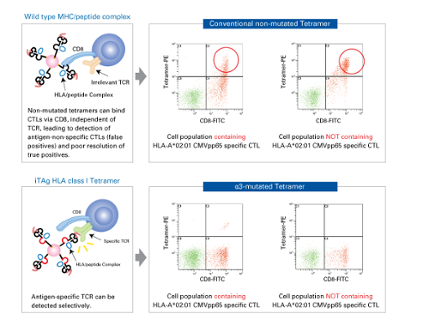Human herpesvirus 6 (HHV-6) is a virus that exists as 2 species, HHV-6A and HHV-6B. HHV-6B, the more widespread species, is a pathogen infecting more than 90% of individuals world-wide during childhood and then establishing a latent and lifelong infection. HHV-6B reactivation occurs in its immunocompromised host (e.g. patients receiving allogeneic hematopoietic stem cell or solid-organ transplantation and AIDS patients) and causes severe complications.
Recently, there have been notable advances in defining T-cell responses specific to HHV-6 and in developing approaches to adoptive immunotherapy. By enhancing the body’s immune response to the pathogen, it is thought the virus will have less ability to live and progress.
Monitoring of HHV-6B-specific T-cells using MHC Tetramers is useful for understanding of these T-cell responses. MHC Tetramers can detect T-cells specific to HHV-6 and measure the effectiveness of immunotherapy candidates. Those candidates that increase the immune response could become future immunotherapy treatments.
Product Highlights
| Cat. No. | Product Name |
|---|---|
| TS-M143-1 | HLA-A*02:01 HHV-6B U54 Tetramer-ILYGPLTRI-PE |
| TS-M143-2 | HLA-A*02:01 HHV-6B U54 Tetramer-ILYGPLTRI-APC |
| TS-M164-1 | HLA-A*24:02 HHV-6B U54 Tetramer-PFHCSFHTI-PE |
| TS-M164-2 | HLA-A*24:02 HHV-6B U54 Tetramer-PFHCSFHTI-APC |
Superior Specificity with MBLI Tetramers
• White Paper: Analysis of neoantigen-reactive T cells using the QuickSwitch™ custom tetramer kit
• Evaluating the biological activity of a cancer vaccine with the HLA-A*02:01 QuickSwitch™ Quant platform
• New Alleles added to the MHC Class I Tetramer Range
• Class II MHC Tetramers Available from MBL International

